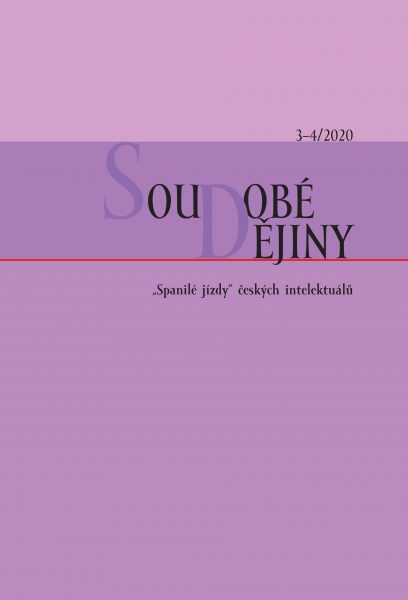"Temné jeho oči doslova fascinují"
"His dark eyes are literally fascinating"
The trip of Czech cultural representatives to Germany and the Netherlands in September 1940
Author(s): Jiří KřesťanSubject(s): History, Cultural history, Political history, Czech Literature, WW II and following years (1940 - 1949), Fascism, Nazism and WW II
Published by: AV ČR - Akademie věd České republiky - Ústav pro soudobé dějiny
Keywords: Czechoslovakia;Protectorate of Bohemia and Moravia;Third Reich;Czech culture;intellectuals;Nazi propaganda;collaboration
Summary/Abstract: Between 1939 and 1943, trips to Nazi Germany and to territories occupied by Germany (France, Belgium, the Netherlands, Poland, a large part of the Soviet Union) ranked among important tools influencing the public opinion in the so-called Protectorate of Bohemia and Moravia. The study deals with a trip of a group of Czech intellectuals – artists, representatives of culture and journalists – to Germany and the Netherlands in September 1940. Under German guidance, the 35-strong delegation was composed to give a representative and diverse impression. Apart from newspapermen collaborating with Germans, such as Karel Lažnovský (1906–1941) or Vladimír Krychtálek (1903–1947), men active in different segments of culture were invited as well, including personalities as outstanding as the directors of the dramatic company and the opera ensemble of the National Theatre in Prague, Jan Bor (1886–1943) and Václav Talich (1883–1961), respectively, operatic singers Jan Konstantin (1894–1965) and Pavel Ludikar (1882–1970), violin virtuoso Váša Příhoda (1900–1960), publisher Bedřich Fučík (1900–1984), or architect Jan Sokol (1904–1987). The study focuses primarily on five writers who took part in the trip. Jaroslav Durych (1886–1962) and Václav Renč (1911–1973) ranked among Catholic-oriented authors, while Josef Knap (1900–1973) and Jan Čarek (1898–1966) represented so-called ruralists (writers of the country), and Josef Hora (1891–1945) was a leading poet, initially writing social poetry and later reflexive lyric poetry. Between the wars, all of them had been critical toward the reality of the First Republic in one way or another, the first four from conservative positions and Hora on the left (until 1929, he had been a member of the Communist Party). The trip’s programme had been put together very ingeniously. In addition to proofs of the Third Reich’s brutal strength (a visit of the bombed-out city of Rotterdam, a sightseeing tour of the Krupp arms factory in Essen), the travelers were served a menu of diverse cultural experiences (visits of theatrical performances, exhibitions and museums, outstanding architectural creations etc.). In Berlin, they were received by Joseph Goebbels (1897–1945), Reichsminister of Public Enlightenment and Propaganda, who emphasized, while addressing them, that the survival of the Czech nation and its culture depended on its submission to the German Reich. Upon their return home, all participants were forced to give public statements about the trip and their impressions, which had to conform to Nazi propaganda. Having described the above facts, the author analyzes defence strategies which the above mentioned authors were using while writing made-to-order articles or showing their supposed loyalty in order to avoid being dragged into the Nazi propaganda machine. They were bypassing some topics, resorting to allegories and ambiguities, and making use of concealed irony. In the end of the study, the author follows the fates of those who took part in the trip to Germany and the Netherlands, pondering, in a more general manner, fuzzy boundaries and dilemmas of guilt and collaboration in a totalitarian regime. Attached to the article are short biographies of all thirty-five participants in the trip.
Journal: Soudobé Dějiny
- Issue Year: XXVII/2020
- Issue No: 3+4
- Page Range: 538-575
- Page Count: 38
- Language: Czech

